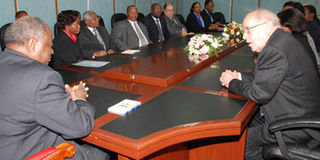Kivuitu team faces axe over poll riots

President Mwai Kibaki meets with members of the Independent Review Commission into the post election violence led by its chairman Justice Johann Kriegler who paid him a courtesy call at his Harambee House office, Nairobi.
What you need to know:
- Members of the Kriegler commission meet with President Kibaki at his Harambee House Office in Nairobi.
- Commission decided to call on the President to find out whether it would be acting within its mandate to draw up recommendations against ECK.
- Sources say team was prompted to meet President following strong proposals by LSK and IED.
The fate of ECK boss Samuel Kivuitu and the other 21 electoral commissioners appeared to be sealed on Tuesday when it emerged that they could pay the price for last year’s presidential election.
President Kibaki gave the Kriegler Commission the green light to make any recommendations they deemed fit on the Electoral Commission of Kenya and any other aspects of the electoral process.
Sources said the President told members of the Independent Commission of Inquiry into last year’s elections that they would not be overstepping their mandate by making adverse proposals against the ECK.
Disbanding ECK
The sources said that disbanding the ECK was an option given that strong recommendations had been made before the commission.
Members of the Kriegler commission met with President Kibaki at his Harambee House Office in Nairobi.
Violence broke out after the electoral commission announced that President Kibaki had won the election beating his closest rival Prime Minister Raila Odinga. The violence left more than 1,200 people dead and 350,000 displaced.
The commission met Mr Odinga six weeks ago, according to the PM’s spokesman, Mr Salim Lone. A resettlement programme is currently underway and the Government says only 20,000 people were still in camps for uprooted families.
The commission headed by retired judge Johann Kriegler from South Africa decided to call on the President to find out whether it would be acting within its mandate to draw up recommendations against the Kivuitu led team that presided over last year’s elections which plunged the country into two months of bloodshed.
The Kriegler commission, sources said, was concerned that negative sentiments had been building up during the hearings and could not be ignored in their final report.
Sources said the Kriegler team was prompted to make the visit following strong presentations by the Law Society of Kenya and the Institute for Education in Democracy.
Law society chairman Okong’o O’Mogeni had proposed that electoral commission be disbanded on grounds that it had suffered irreparable damage.
Recommendations
That perhaps explains why the Presidential Press Services statement made a pitch for clear recommendations by the Kriegler team in line with its mandate.
“The Head of State said the Commission’s mandate was important in finding a permanent solution to the challenges facing Kenya’s electoral process as experienced in the last General Election and other past elections,” said the statement.
According to the statement, the Kriegler team had gone “to update the Head of State on the progress of its work.”
The meeting was attended by Justice, National Cohesion and Constitutional Affairs minister Martha Karua, Head of Civil Service Francis Muthaura and Justice permanent secretary Amina Mohamed among other key Government officials.
President Kibaki appointed the Kriegler commission on March 14 and gave the eight-member team six months to complete its work of establishing the underlying causes of the electoral challenges experienced during and after the December 27 elections.
On Wednesday, the team told the President that it would complete its work on time and submit a comprehensive report. So far, it has held public hearings in all provincial headquarters and received numerous written memoranda.
It has convened workshops on electoral systems, political parties, the media and the electoral commission.
The legal fraternity also pointed to the lack of power by the Kivuitu team to enforce electoral laws and code of conduct and the failure to computerise its operations as inadequacies that must be addressed.
In its submissions by Ms Elizabeth Marete, an Institute for Education in Democracy programme officer, said the ECK lacked autonomy.
It also questioned the procedures of appointing commissioners and pointed out the shortfalls and lack of financial autonomy as areas that needed to be corrected in far reaching reforms.
“Institute for Education in Democracy fully supports the electoral reform process and will stop at nothing to support the establishment of appropriate elections administration, elections management body and structures in Kenya,” she said.
The local chapter of the International Commission of Jurists had made similar recommendations.
When the commissioners went before the Kriegler team on Monday, led by vice chairman Kihara Mutu, they also called for wide ranging reforms in the electoral laws to enable them deal with challenges that normally arise during elections.
Urgent reforms
But as Mr Justice Kriegler agreed with them on the need for urgent reforms in the electoral commission, he criticised the team and told them that they were retrogressing instead of improving the country’s electoral system.
“It’s quite unfortunate that the country’s electoral systems are getting worse by the day...in fact the 1992 elections were better organised than 2007. That is why we are calling for these reforms in the commission,” he said.
This strong stance is likely to have been the reason that the retired judge decided to take his team to the President and seek his assurance that their recommendations on the electoral commission would not be thrown aside on grounds that they acted beyond their mandate.




